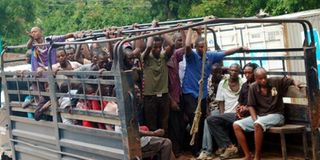Only solid evidence can help lock up planners of lethal terrorist attacks

Some of the youths arrested inside Masjid Musa and Masjid Sakina mosques in Majengo in a raid on November 16, 2014. PHOTO | LABAN WALLOGA |
What you need to know:
- The operation in Mombasa would have to be based on very solid information.
- One might argue that the raid on the Mombasa mosques was just a routine security operation, but this does not seem likely.
One would hope that before the police conducted the operation targeting two mosques in Mombasa suspected to be centres of jihadist teachings, the full ramifications were taken into account.
Any such operation would have to be based on very solid information that the two houses of worship were being used for the recruitment and training of terrorists, the planning of violent attacks, storage of arms, and other activities that pose a serious threat to national security.
It follows that police storming of the Sakina and Musa mosques on Mombasa island could not have just been planned at the local precinct level; the operation would need authorisation from the highest security organs in the country, in this case the National Security Council chaired by no less than President Uhuru Kenyatta.
Other members of the council include Deputy President William Ruto and three Cabinet secretaries — Joseph ole Lenku, Interior, Raychelle Omamo, Defence, and Amina Mohammed, Foreign Affairs.
The rest are Inspector-General of Police David Kimayo, Chief of Kenya Defence Forces Julius Karangi, and Director-General of the National Intelligence Service Philip Kameru.
SPREADING JIHADIST MESSAGE
One might argue that the raid on the Mombasa mosques was just a routine security operation, but this does not seem likely when weighed against the inherent risks.
From both the security and political perspectives, the potential fallout would have to be clearly assessed and a decision made that the benefits outweigh the risks.
One of the gravest risks that has to be factored in is that such raids might drive the Muslim community further into the arms of the radical preachers, who are increasingly taking control of mosques and schools.
They are spreading the jihadist message of violence linked to the Al-Shabaab terrorist group and farther afield to what looks like the march of violent Islam, as exemplified by the Islamic State movement spreading across Syria and Iraq.
The more the government reacts with a heavy hand, the more the moderate voices of reason within the Muslim community are isolated and drowned out, and the more the violent extremists spread their tentacles.
Any such shifts are directly discernible across the leadership, where MPs and governors from the Muslim community often speak out reflexively in solidarity with their faith rather than support security measures against radicals.
LINKED TO INDIVIDUALS
Such raids can, therefore, be counter-productive unless they come with the buy-in of the local political, community, and religious leaders, and unless it can be demonstrated without a shadow of a doubt that storming the mosques was vital to counter terrorist activities.
Unfortunately, from past raids, very little evidence was forthcoming and most of those arrested eventually had to be released because no criminal prosecution could be sustained.
In the latest raids, the police put on display an assortment of weapons they said were recovered, including eight hand grenades and two handguns, as well as what can only be described as kitchen utensils and workshop and garden tools.
Also recovered was the ubiquitous Al-Shabaab flag and a variety of DVDs supposedly containing literature on extremist Islam and terrorist training manuals.
That might look like compelling evidence, but it means nothing in a court of law unless it can be linked to specific individuals.
We were told that the police acted on intelligence information before raiding the mosques.
PARADED IN LEG IRONS
Unless the raids were premature, I would expect that any half-competent security intelligence operation would have gathered solid evidence in the form of audio and video recording from a terrorist-training class or a planning session for a terrorist attack.
That is what can stand up in both a court of law and the court of public opinion.
I look forward to seeing the terrorist suspects arrested at the Sakina and Musa mosques paraded in leg irons before a court of law to answer the most severe charges in our penal code.
Treason, with the death penalty, is the most suitable punishment for traitors and saboteurs in the service of a mad philosophy and who would plot to kill and maim innocent men, women, and children.
Any case in court can only be based on solid evidence, not mere suspicion, rumour, and half-baked investigations. These are cases I look forward to covering.
[email protected]. @MachariaGaitho on Twitter





